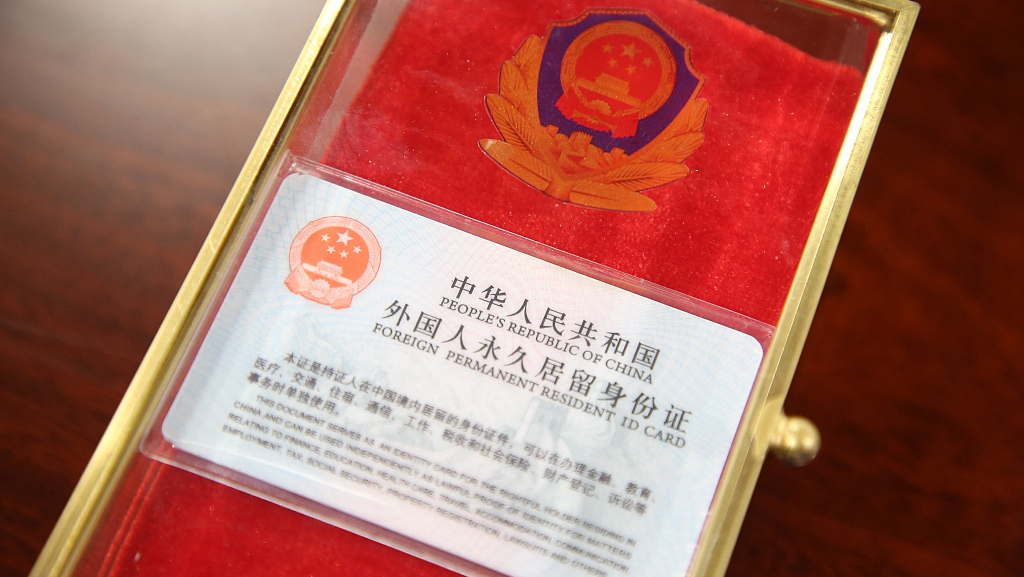

Editor's note: Matteo Giovannini is a finance professional at ICBC in Beijing and a member of the China Task Force at the Italian Ministry of Economic Development. The article reflects the author's opinion, and not necessarily the views of CGTN.
On August 1, China's Ministry of Public Security implemented 12 policies and measures to facilitate the entry and exit of foreigners and the stay of foreigners in China. The revised policies, which were introduced to the public on July 17, open up the door to more highly skilled overseas workers and allow a greater number of foreigners the opportunity to become permanent residents.
The new policies add three new types of individuals who are now eligible for permanent residency. "The first category covers high-level foreign talent, including people who have made significant contributions and those in special demand; the second applies to foreigners working in China who have worked in the country for at least four consecutive years with annual income at least six times the average of the city of residence and with an annual personal income tax no less than 20 percent of the salary; the third category refers to overseas Chinese who have a doctoral degree or who have worked in national key development areas in China for at least four consecutive years".
Probably the most interesting aspect of the new policies is the one related to the widening of the scope of long-term visa and resident's permits for foreigners working or studying in China. This is the case for roughly 99.9 percent of the expats' population in China who, in order to study and work in the country, needs an appropriate visa and a resident permit.
According to the new policy, "Foreign talents invited by key domestic universities, scientific research institutes and well-known enterprises engaged in key fields will be issued visas or resident's permits valid for two to five years. China will also provide convenient visa and resident's permit services to outstanding foreign students who have graduated from key domestic universities or internationally renowned universities and want to start businesses or participate in innovation in China".

Kurt Wüthrich, a Swiss scientist and winner of the Nobel Prize in Chemistry in 2002, has become a permanent resident of Shanghai, April 2, 2018. /VCG Photo
There are at least three messages that can be taken from these policies:
Firstly, it has been tapped one of the most visible gap in China's immigration rules. Previously students who had completed an undergraduate or postgraduate degree and were not able to immediately find a job had to leave the country at the expiration of the student visa. Taking example from the Tier-1 Post-Study Work visa, a way for international graduates from UK universities to remain in the UK for a year after graduation in order to gain some UK working experience, China is now incentivizing the younger generation to stay in China to develop its career in innovation-related fields and to start its own business.
Secondly, the reform on green cards is an essential policy for a country to attract global minds to stay for the long term with no restrictions in terms of access to education for the kids, access to a retirement plan, possibility to invest in domestic financial products and to buy a property. In this sense, China is becoming more a place where foreigners plan their future rather than a place where to get an experience good for the resume or a destination where to complete an overseas assignment.
Lastly, from a larger perspective, China is no more the world's factory but it is quickly moving to produce and offer higher-value products and services. Taking into account that economists predict that in the future an aging population will have effects on the labor market causing a number of economic and social problems related to the reduced number of people who participate in the labor market, China is getting ready by leveraging a high-quality immigration who can contribute to the development in fields like robotics and artificial intelligence.
China's new rules on immigration show a clear strategy of the country targeted to attract the best minds in innovation-related fields. It is a win-win strategy where on one side foreign talents find a welcoming and vibrant environment where to deploy their skills and on the other side China can continue its innovation race for the leadership in the key industries of the future. China is clearly going in the right direction.
(If you want to contribute and have specific expertise, please contact us at opinions@cgtn.com.)

Copyright © 2018 CGTN. Beijing ICP prepared NO.16065310-3
Copyright © 2018 CGTN. Beijing ICP prepared NO.16065310-3